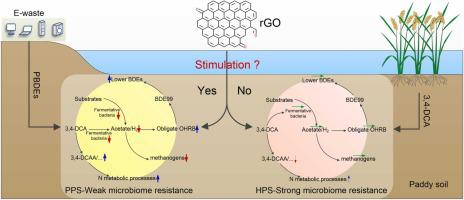当前位置:
X-MOL 学术
›
J. Hazard. Mater.
›
论文详情
Our official English website, www.x-mol.net, welcomes your
feedback! (Note: you will need to create a separate account there.)
Microbiome resistance mediates stimulation of reduced graphene oxide to simultaneous abatement of 2,2′,4,4′,5-pentabromodiphenyl ether and 3,4-dichloroaniline in paddy soils
Journal of Hazardous Materials ( IF 12.2 ) Pub Date : 2023-11-30 , DOI: 10.1016/j.jhazmat.2023.133121 Yi Sun 1 , Ying Teng 1 , Ran Li 2 , Xia Wang 1 , Ling Zhao 1
Journal of Hazardous Materials ( IF 12.2 ) Pub Date : 2023-11-30 , DOI: 10.1016/j.jhazmat.2023.133121 Yi Sun 1 , Ying Teng 1 , Ran Li 2 , Xia Wang 1 , Ling Zhao 1
Affiliation

|
Paddy soils near electrical and electronic waste recycling sites generally suffer from co-pollution of polybrominated diphenyl ethers and 3,4-dichloroaniline (3,4-DCA). This study tested the feasibility of reduced graphene oxide (rGO) to stimulate the simultaneous abatement of 2,2′,4,4′,5-pentabromodiphenyl ether (BDE99) and 3,4-DCA in percogenic paddy soil (PPS) and hydromorphic paddy soil (HPS). rGO improved the debromination extent of BDE99 and the transformation rate of 3,4-DCA in PPS, but did not affect their abatement in HPS. The inhibition of specific fermenters, acetogens, and methanogens after rGO addition contributed to BDE99 debromination by obligate organohalide-respiring bacteria (OHRB) in PPS, but relevant soil microbiomes (e.g., fermenters, acetogens, methanogens, and obligate OHRB) responded little to rGO in HPS. For 3,4-DCA, the enhanced activities of nitrogen-metabolic chloroaniline degraders by rGO increased its transformation rate in PPS, but was compensated by the decreased biotransformation from 3,4-DCA to 3,4-dichloroacetanilide after the addition of rGO to HPS. The discrepant stimulation of rGO between PPS and HPS was mediated by soil microbiome resistance. rGO has the application potential to stimulate the simultaneous abatement of polybrominated diphenyl ethers and chloroanilines in paddy soils with relatively low microbiome resistance.
中文翻译:

微生物组抗性介导还原氧化石墨烯的刺激,以同时减少水稻土壤中 2,2′,4,4′,5-五溴二苯醚和 3,4-二氯苯胺
电气和电子废物回收场附近的稻田通常受到多溴联苯醚和 3,4-二氯苯胺 (3,4-DCA) 的共同污染。本研究测试了还原氧化石墨烯 (rGO) 刺激 2,2′,4,4′,5-五溴二苯醚 (BDE99) 和 3,4-DCA 同时还原水稻土 (PPS) 和水文水田土壤 (HPS) 中的可行性。rGO 提高了 PPS 中 BDE99 的脱溴程度和 3,4-DCA 的转化率,但不影响它们在 HPS 中的减弱。添加 rGO 后对特定发酵罐、产乙酸菌和产甲烷菌的抑制有助于 PPS 中专性有机卤化物呼吸细菌 (OHRB) 对 BDE99 脱溴,但相关土壤微生物组(例如,发酵罐、产乙酸菌、产甲烷菌和专性 OHRB)对 HPS 中的 rGO 反应甚微。对于 3,4-DCA,rGO 对氮代谢氯苯胺降解剂活性的增强提高了其在 PPS 中的转化速率,但被向 HPS 中添加 rGO 后从 3,4-DCA 到 3,4-二氯乙酰苯胺的生物转化减少所补偿。PPS 和 HPS 之间对 rGO 的差异刺激是由土壤微生物组抗性介导的。rGO 具有刺激多溴二苯醚和氯苯胺在微生物组抗性相对较低的水稻土壤中同时减少的应用潜力。
更新日期:2023-11-30
中文翻译:

微生物组抗性介导还原氧化石墨烯的刺激,以同时减少水稻土壤中 2,2′,4,4′,5-五溴二苯醚和 3,4-二氯苯胺
电气和电子废物回收场附近的稻田通常受到多溴联苯醚和 3,4-二氯苯胺 (3,4-DCA) 的共同污染。本研究测试了还原氧化石墨烯 (rGO) 刺激 2,2′,4,4′,5-五溴二苯醚 (BDE99) 和 3,4-DCA 同时还原水稻土 (PPS) 和水文水田土壤 (HPS) 中的可行性。rGO 提高了 PPS 中 BDE99 的脱溴程度和 3,4-DCA 的转化率,但不影响它们在 HPS 中的减弱。添加 rGO 后对特定发酵罐、产乙酸菌和产甲烷菌的抑制有助于 PPS 中专性有机卤化物呼吸细菌 (OHRB) 对 BDE99 脱溴,但相关土壤微生物组(例如,发酵罐、产乙酸菌、产甲烷菌和专性 OHRB)对 HPS 中的 rGO 反应甚微。对于 3,4-DCA,rGO 对氮代谢氯苯胺降解剂活性的增强提高了其在 PPS 中的转化速率,但被向 HPS 中添加 rGO 后从 3,4-DCA 到 3,4-二氯乙酰苯胺的生物转化减少所补偿。PPS 和 HPS 之间对 rGO 的差异刺激是由土壤微生物组抗性介导的。rGO 具有刺激多溴二苯醚和氯苯胺在微生物组抗性相对较低的水稻土壤中同时减少的应用潜力。































 京公网安备 11010802027423号
京公网安备 11010802027423号